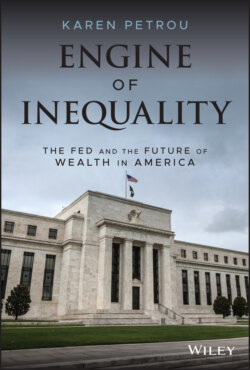Engine of Inequality

Реклама. ООО «ЛитРес», ИНН: 7719571260.
Оглавление
Karen Petrou. Engine of Inequality
Table of Contents
List of Tables
List of Illustrations
Guide
Pages
Engine of Inequality. The Fed and the Future of Wealth in America
Acknowledgments
About the Author
Introduction
Notes
Chapter 1 Inequality: Why It's So Much Worse and What to Do About It
What We Know about Inequality that Economists Don't
The Economic-Recovery Mirage
Why So Unequal So Fast?
Regulatory Wreckage
How to Fix Financial Policy
Notes
Chapter 2 How Unequal Are We?
Economic Inequality Fundamentals
Who Has How Much
What of Wealth?
The Inequality Engine
Worse Than That
The Most Inclusive Ever?
The Great Financial Crisis and Its Equality Aftermath
Notes
Chapter 3 What Makes Us So Unequal
The Mechanical Engineering of Economic Inequality
Death and Taxes
The Role of Transfer Payments
A Supply-Side Solution?
Public Wealth: A Sputtering Part in the Equality Engine
Is Education the Answer?
Is Trade Policy a Problem?
Global Policy Reform?
What to Do?
Notes
Chapter 4 Why Does Economic Inequality Matter So Much?
Inequality and Mortality
Political Polarization
Inequality's Eviscerating Cost
Inequality and the Long Recession
Financial-Crisis Risk
Notes
Chapter 5 Following the Money
How Central Banks Work
The Modern Monetary-Policy Construct
The Fed's Bailout Buckets
The Fed's Payment Powers
Rules of the Financial Road
Four Fundamental Financial-Policy Flaws
Notes
Chapter 6 How Monetary Policy Made Most of Us Poorer
The Fed's Heavy Hand
Why It's the Fed's Fault
How Ultra-Low Interest Rates Made America Still Less Equal and QE Still More Inequitable
The High Cost of Low-Rate Debt
The Low-Unemployment Myth
The Anti-Wealth Effect
Making Matters Still Worse
A Bigger Fed, Lower Rates, an Extreme Financial Crisis
Notes
Chapter 7 How to Make Monetary Policy Make Us More Equal
The Aggregate-Data Error
The Fed's Real Mandate
The Fourth Mandate
The Fed's Giant Faucet
Possible Solutions
Slowing the Inequality Engine
Notes
Chapter 8 Reckoning with Regulation
Consumer Finance Before the Crash
Are Debtors Just Deadbeats?
Are Banks to Blame?
The Businesses Banks Left Behind
Other Precursors of the Crash That Came
Capitalism and Capital Regulation
A Capital Cure
Going with the Flow
Death without Destruction
The Consumer-Protection Quagmire
An Unreadable Rulebook Thrown Only at Banks
The Bleak Outlook and a Better Future
Notes
Chapter 9 Remaking Money
What Money Is and Will Be
The Great Unequalizer
Turning Money into Data
What Makes Money Good Money
Crafting a Good Digital Dollar
How Money Moves
The Central-Bank Solution
Notes
Chapter 10 Rules to Equitably Live By
Why Not Just Deregulate?
Learning to Love Like-Kind Rules
The Specifics of Symmetric Regulation
Raising Up the Regulatory Playing Field
Building a New, Equality-Focused Banking System
Banking While Mailing
Establishing Equality Banks
New Money for a New Mission
Notes
Chapter 11 Financial Policy for an Equitable Future
Turning the Fed into a Force for Good
The Fed's Failings
The Fed's Equality Toolkit
The First Fix: Understanding America as It Is
The Second Fix: Set an Equality Plan and Say So
The Third Fix: A Far Smaller Fed Portfolio
The Fourth Fix: Normal, Moderate Interest Rates
The Final Fix: Ensuring Financial Stability
Ending the Doom Loop
The Future of Equitable Finance
Notes
Index
WILEY END USER LICENSE AGREEMENT
Отрывок из книги
Karen Petrou
The Obama Administration also congratulated itself on the sound economy and resilient financial system, Hillary Clinton campaigned on renewed prosperity, Americans knew more than economists about their own struggles, Donald Trump won, markets climbed higher, economic growth remained weak, and America grew ever angrier as economic inequality rose even higher. By 2020, COVID blew away every one of the foundations on which the Fed thought the economy and financial system so securely rested. A decade of rising financial markets atop acute economic and racial inequality made the US as vulnerable to an economic shock as an ill-kempt nursing home to the coronavirus.
.....
To be sure, many Americans owned stock in 401(k) plans and mutual funds. But wealth doesn't come from just owning stock; it's of course due to how much you own. The percentages showing that the rich benefit most from rising financial markets of course reflect the fact that stock ownership is best measured by the value of the shares each person owns, not by the number of people who own them.
As a result, Fed asset purchases stoked stock-market rises that dramatically increased the wealth of those able to invest in the stock market. From 2007 to 2019, the S&P index for stocks rose 77 percent; that is, an investor with $10,000 in the market at the start of the crisis would have $17,700 to show for it after these twelve years. As shown below, small savers who were not also stock-market investors were worse off than ever before. Wealth inequality was thus even worse than it was before 2008, and the Fed is to blame for at least part of it.
.....